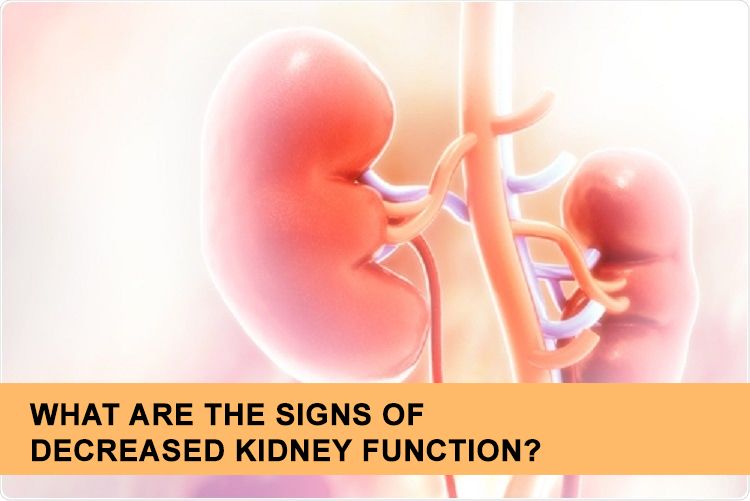
Your kidneys can be sort of like the unsung superheroes in your body, heroically working, often out of sight, to protect your health. These bean-shaped organs help filter waste, balance fluid in the blood, and regulate critical functions like blood pressure and red blood cell production. But when kidney function begins to diminish, your body is often quick to send out subtle (and not-so-subtle) signs. It can make a big difference in receiving the care you need if you recognize these signs early. Kidney failure treatment in Ayurveda also advises renal patients to look out for these warning signs early for a better prognosis. So let’s take a deep dive into what it means to have decreased kidney function, and let’s do it in a way that feels like we’re talking over a cup of coffee.
Before we get into the signs, let’s quickly touch on why your kidneys are such a big deal. Each day, they filter about 120-150 quarts of blood to produce urine, removing toxins and excess fluids. They also help control electrolyte levels, maintain bone health, and even play a role in keeping your heart happy. When kidney function dips, whether due to chronic kidney disease (CKD), an infection, or another issue, these processes get disrupted, and your body starts waving little red flags.
Decreased kidney function doesn’t always scream for attention right away. It can creep up slowly, especially in conditions like CKD, which affects about 1 in 7 adults in the U.S. That’s why knowing the signs is so important. Let’s break them down.
Ever feel like you’re dragging through the day, even after a full night’s sleep? Decreased kidney function can lead to a buildup of toxins in your blood, making you feel sluggish. Your kidneys also help produce erythropoietin, a hormone that signals your body to make red blood cells. When they’re not working well, you might develop anemia, which zaps your energy even more. If you’re constantly exhausted and can’t pinpoint why, it’s worth checking in with your doctor.
Notice your ankles, feet, or hands looking puffier than usual? This swelling, called edema, happens when your kidneys struggle to remove excess fluid. Instead of flushing it out, the fluid sticks around, causing bloating or tightness. You might also notice puffiness around your eyes, especially in the morning. It’s like your body’s saying, “Hey, something’s not right here!” Dr. Puneet Dhawan of Karma Ayurveda Hospital for kidney failure treatment also flags puffiness to be a major symptom of kidney disease.
Your kidneys are all about urine production, so it makes sense that changes in how you pee can be a clue. Some signs to watch for include:
These changes can feel embarrassing to talk about, but they’re important clues your body is giving you.
Itchy skin might seem unrelated to your kidneys, but it’s a surprisingly common sign. When your kidneys can’t remove waste effectively, toxins build up in your blood, leading to persistent itching. You might also notice dry, flaky skin. It’s not just a cosmetic issue; it’s your body begging for attention. If you’re scratching more than usual and moisturizers aren’t helping, your kidneys could be part of the puzzle.
Feeling winded after climbing a few stairs or even just sitting still? Decreased kidney function can cause fluid to build up in your lungs, making it harder to breathe. Anemia, which we mentioned earlier, can also leave you short of oxygen, adding to that breathless feeling. If this is new for you, don’t brush it off as “just getting older.”
Your kidneys and blood pressure are besties; they work together to keep things balanced. When kidney function declines, it can mess with this relationship, leading to high blood pressure. On the flip side, uncontrolled hypertension can further damage your kidneys, creating a vicious cycle. If your blood pressure meds aren’t working as well as they used to, it’s time to have a conversation with your healthcare provider.
Ever notice a weird metallic taste in your mouth or feel like your breath smells off, no matter how much you brush? This can happen when waste builds up in your blood (a condition called uremia). It might also make food taste different, leading to a loss of appetite or unintentional weight loss. It’s not just annoying; it’s a sign your kidneys are struggling.
That same buildup of toxins can leave you feeling queasy, like you’re on a never-ending rollercoaster. Nausea, vomiting, or just not feeling hungry can all point to kidney issues. These symptoms are easy to chalk up to a stomach bug or stress, but if they linger, don’t ignore them.
Kidneys help balance electrolytes like calcium and potassium, which keep your muscles happy. When they’re not functioning well, imbalances can lead to painful cramps or even muscle twitching. If you’re waking up with leg cramps or feeling “twitchy,” it might be more than just dehydration.
If any of these symptoms sound familiar, don’t panic, but don’t ignore them either. Decreased kidney function is often manageable, especially if caught early. Here’s what you can do:
Your kidneys work hard every day, and they deserve a little love and attention. The signs of decreased kidney function can be sneaky, blending into the chaos of daily life. But by listening to your body, whether it’s that persistent fatigue, swollen ankles, or weird taste in your mouth, you can catch problems before they snowball. If something feels off, reach out to your healthcare provider, or you can check out Ayurvedic treatment for kidney failure as well.

Certificate no- AH-2023-0186
JAN 05,2023-JAN 04,2026
"Ayurveda is not just a system of medicine; it's a way of life. Connect with us to embrace a lifestyle that nurtures your body, mind, and soul."
Book Consultation Now